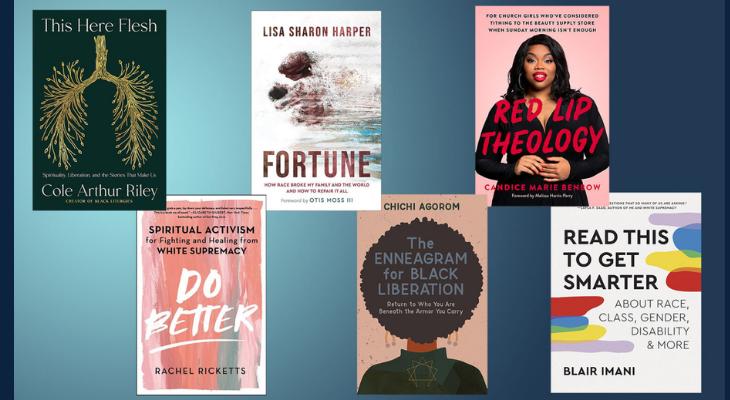Revolution with Ease: Six Books by Black Women on Justice
March 21, 2022

(RNS) — Black women have always been in the vanguard of the struggle for Black freedom. Yet on the topic of racial justice, the names of great men are often the first to be heard. I’m thinking of the public theologians the Rev. Martin Luther King Jr. and Malcolm X, whose names are often invoked as the north and south poles of Black liberation.
I lament that the same has been true of my own activist work. In my early days in the movement, my activism was largely informed by the writings of Black men. While I don’t regret reading King, Brother Malcolm, Kwame Ture and James Baldwin, I consider it a costly loss that so many of us are so unfamiliar with the justice work of Black women.
I call it costly for a deeply personal reason. The male voices who informed my work emphasized the militant values we praise in soldiers: courage, duty, sacrifice. I burned myself out trying to be a good soldier for Black Lives, largely because the militant men provided no clear framework for play, pleasure and rest in their teachings on freedom and justice. With only militant men as my guides, at times it felt like these basic human desires for play and pleasure were incongruent with serious revolutionary commitment.
When I listen to Black women and femmes, from the late poet Audre Lorde to the activist, speaker and author Rachel Cargle, I hear a different vernacular of liberation. I often hear the values of ease, softness, rest and pleasure evoked as means and ends of freedom values I seldom if ever encountered in the work of Black male revolutionaries. Their perspectives demonstrate that if the conversation around racial justice is framed only by Black men, the frame is too small to define what freedom means in any complete way.
Here are six authors writing from a spiritually informed perspective that I’m reading this year.
Blair Imani: “Read This to Get Smarter About Race, Class, Gender, Disability & More”
Imani is a critically acclaimed historian, author and educator with a gift for making complex, abstract concepts approachable. Like her viral teaching series “Smarter in Seconds,” “Read This to Get Smarter” is generous, clear and concise, meeting readers on the ground floor of some of the most important social justice conversations of our time and showing them how to be more compassionate, informed people.
Rachel Ricketts: “Do Better: Spiritual Activism for Fighting and Healing From White Supremacy”
Half the battle for a better world — that is, unlearning a common sense that was formed by supremacy culture — is fought on spiritual terrain: Ricketts offers a guidebook for doing the internal work of healing from supremacy culture that is essential for those who want to confront the external structures of white supremacy.
Cole Arthur Riley: “This Here Flesh: Spirituality, Liberation, and the Stories That Make Us”
In the wake of the killing of George Floyd, Arthur Riley provided a space for thousands of people to breathe when she created the Black Liturgies on Instagram, offering quotes from famous Black thinkers for contemplation and prayers that center Black dignity. “I knew white men couldn’t teach me how to pray,” she said in a recent interview to summarize the project.
In “This Here Flesh,” Arthur Riley shares stories and reflections on discovering the sacred in her skin. In these deeply transporting passages, she reflects on the stories of her grandmother and father and how they revealed to her an embodied, dignity-affirming spirituality, not only in what they believed, but in the act of living itself.
Candice Marie Benbow: “Red Lip Theology: For Church Girls Who’ve Considered Tithing to the Beauty Supply Store When Sunday Morning Isn’t Enough”
Public theologian Benbow situates her work at the intersections of beauty, faith, feminism and culture, giving voice to Black women’s shared experiences of journeying toward wholeness. “Red Lip Theology” is a collection of essays inviting Black women to find freedom in a progressive Christian faith that incorporates activism, feminism and radical authenticity.
Lisa Sharon Harper: “Fortune: How Race Broke My Family and the World — and How to Repair It All”
Harper’s “Fortune” is a monumental work that took three decades of research to create. Harper, a leading Christian activist, traces 10 generations from her first non-Indigenous ancestor born on American soil — a girl named Fortune — to show how American ideas, customs and laws robbed her ancestors, and those of so many others, of their humanity and flourishing.
Chichi Agorom: “The Enneagram for Black Liberation: Return to Who You Are Beneath the Armor You Carry”
The Enneagram is everywhere: Twitter bios, Tinder profiles and countless social media accounts. Yet the majority of popular Enneagram teachers are white, which means our Enneagram conversations often miss the ways our type structures are directly shaped by structural oppression. Writer and psychotherapist Agorom, a certified Enneagram teacher, offers a framework for the Enneagram that centers the experiences of Black women and includes how issues of societal power shape us.
Share
Related Articles
Racial Equity
Immigrant Faith Communities On Rooting Out Anti-Black Racism
Racial Equity
In ‘Truth’s Table’ Book, Women Podcasters Cast Vision for Future of Black Church
American Civic Life



